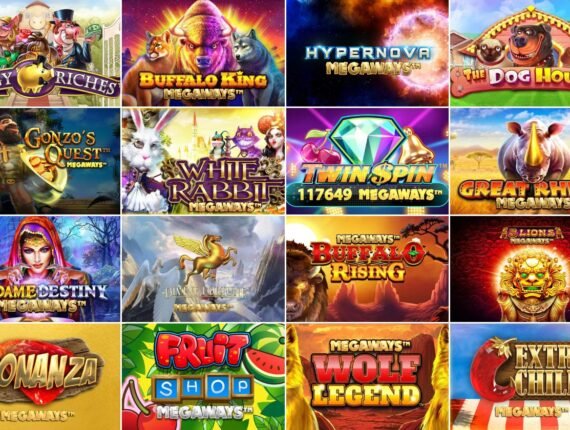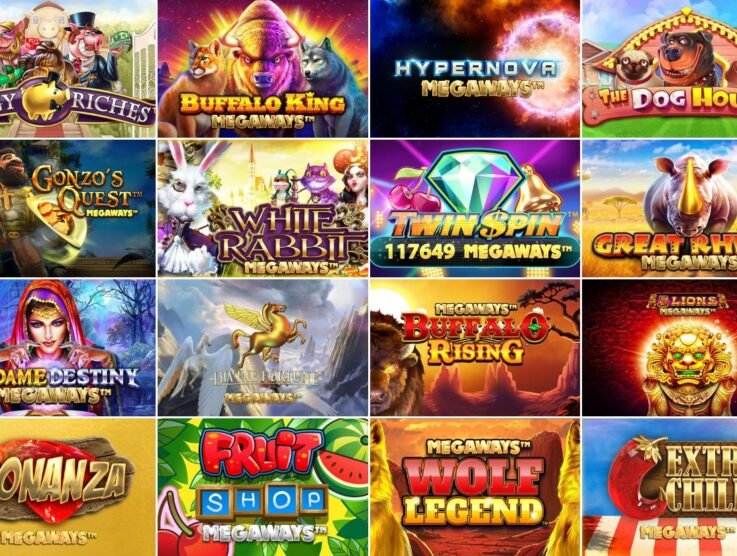Dive into the exciting world of online casinos with our beginner-friendly guide. Discover key facts and tips to make your first experience enjoyable.
Beginner’s Guide To Online Casino Facts

The realm of online casinos has rapidly evolved into a booming industry, captivating players worldwide with its blend of entertainment, convenience, and potential for financial reward. This digital revolution in gambling has transformed the way people engage with casino games, offering an accessible and diverse gaming experience that transcends geographical and physical boundaries.
Understanding the intricacies of online casinos is not just a matter of curiosity but a necessity for both enthusiasts and skeptics alike. As this sector continues to grow, it brings with it a complex array of facts, figures, and features that shape the modern gambling landscape. From the early beginnings of internet betting to the intricate legal frameworks governing its operation, the world of online casinos is as fascinating as it is diverse.
In this article, we delve into various aspects of online casinos, exploring their history, technological advancements, game varieties, and the legal and economic impacts they have on the global stage. Our journey through these digital gambling halls will not only enlighten us about their functioning but also shed light on the future trends that are set to redefine this vibrant industry.
History and Evolution of Online Casinos
The online casino industry, a significant component of internet-based entertainment, has a rich and dynamic history that illustrates its evolution from a novel idea to a multi-billion dollar industry.
The Inception of Online Casinos
The journey of online casinos began in 1994 when the island nation of Antigua and Barbuda passed the Free Trade and Processing Act. This legislation was pivotal, marking the first instance where a government authorized entities to offer gambling services over the internet. This act laid the groundwork for the first online casinos, providing a legal framework that would shape the future of internet gambling.
The First Online Casino Platforms
In the wake of this groundbreaking legislation, the first fully functional gambling software was developed by Microgaming, a company based on the Isle of Man. This software, which was vital for the operation of online casinos, was secured with online security measures from CryptoLogic, another innovator in the industry. Just two years later, in 1996, the world saw the launch of the first online casino where players could wager real money.
This casino, known as InterCasino, marked a significant milestone in the history of online gambling, signaling the industry’s transition from a concept to a tangible reality. Other early platforms, like the Australian Centrebet.com, soon followed, broadening the online gambling landscape and signifying a shift from traditional land-based casinos to the digital domain.
The Proliferation and Growth of Online Gambling
With the foundation set by these early developments, the online casino industry began to grow rapidly. As internet accessibility increased and technology advanced, online casinos expanded their reach, offering an ever-growing variety of games and betting options. This period was marked by significant technological innovations, adaptation to various legal environments around the world, and an increasing acceptance of online gambling as a legitimate form of entertainment.
The history of online casinos reflects not only technological advancement but also a changing cultural attitude towards gambling. It’s a history characterized by legal milestones, technological innovation, and a growing acceptance of digital entertainment platforms.
Legal Landscape of Online Casinos
The legal landscape of online casinos varies significantly across different regions, reflecting diverse approaches to regulation and consumer protection.
North America: A Varied Landscape
In the United States, the legal framework for online betting is quite selective, with only a few states like Nevada, Pennsylvania, and New Jersey having regulated online gambling markets. New Jersey, in particular, stands out as the largest market for regulated online gambling in the U.S., with a well-established system for overseeing online gaming sites.
This includes site licensing, tax revenue collection, and game testing and approval. Canada, however, presents a contrast as an unregulated country in terms of online gaming. Mexico is currently revising its gambling laws, aiming to regulate the online gambling sector to align with the region’s industry standards.
Europe: A Mosaic of Regulations
In the European Union, there’s no single overarching gambling law at the EU level. Instead, the responsibility lies with individual member states, each designing and overseeing its online casino services within the broader framework of the Treaty on the Functioning of the European Union (TFEU). This results in a diverse regulatory environment, with some common EU-wide rules established by the Court of Justice of the European Union (CJEU), focusing on economic activity, public interest, non-discrimination, and effective supervision and enforcement.
Specifically, countries like the Czech Republic and Germany have their unique regulatory frameworks. The Czech Republic offers a balanced and regulated market, fostering competition and consumer protection, with specific requirements for licensing, taxation, technical and operational standards, and player protection. Germany’s online gambling regulation is managed by its 16 federal states, with a harmonized legal framework emphasizing consumer protection, technical requirements, and taxation. German regulations also include specific constraints on the types of games offered and betting limits.
Advancements in Technology and Mobile Gambling
The integration of technologies like augmented reality (AR) and virtual reality (VR) in online gaming experiences has significantly increased player engagement. Moreover, the widespread use of smartphones and tablets has dramatically boosted mobile gambling, allowing bets to be placed anytime and almost anywhere. This technological advancement has greatly influenced the legal frameworks as they adapt to new forms of online gambling.
Technology in Online Casinos
The online casino industry has embraced cutting-edge technologies to enhance user experience and security, leading to a significant transformation in the way players engage with these platforms.
Virtual Reality (VR) Gaming
Virtual Reality (VR) has revolutionized online casinos by providing an immersive and interactive gaming experience. In 2023, VR gaming has become more widespread, allowing players to explore lifelike gaming environments and interact with virtual dealers, simulating the atmosphere of physical casinos from the comfort of their homes.
Personalized Gaming Experiences
Artificial Intelligence (AI) and machine learning are being increasingly utilized in online casinos to offer personalized gaming experiences. By analyzing players’ habits, favorite games, and betting patterns, these technologies enable the delivery of customized game suggestions, promotional offers, and rewards, enhancing user engagement and satisfaction.
Live Dealer Games
Live dealer games have seen immense popularity in recent years. These games, powered by high-definition video streaming, allow real-time interactions with professional dealers, adding a social element to online gambling. Advancements in streaming technology and internet speeds have significantly improved the quality and seamlessness of these games.
Blockchain and Cryptocurrency Integration
Blockchain technology has been integrated into many online casino platforms, offering benefits such as anonymity, security, and fast transactions. This integration has led to the acceptance of cryptocurrencies for deposits and withdrawals, providing added convenience and security for users.
Mobile-First Approach
With the widespread use of smartphones and tablets, online casinos have adopted a mobile-first approach. This trend involves optimizing websites and applications for mobile devices, allowing players to access games anytime and anywhere, thus boosting the popularity of mobile gaming.
Advanced Security Measures
To address growing concerns regarding the safety of players’ information and funds, online casinos have implemented advanced security measures. These include two-factor authentication, end-to-end encryption, and regular security audits, ensuring a secure gaming environment for users.
The incorporation of these technological advancements has not only enhanced the gaming experience but also bolstered security and accessibility in the online casino industry.
Online Casino Games
The world of online casino games is vibrant and diverse, offering a wide range of options to cater to different preferences. Here’s an overview of popular games and the latest trends shaping the online casino experience in 2023.
Popular Game Types
- Slots: Online slots remain a staple in the casino world, offering hours of fun with the potential for large payouts from progressive jackpots.
- Roulette: This classic game of chance continues to captivate players, with its simple yet thrilling gameplay.
- Blackjack: A favorite card game for many, blackjack offers numerous variants and strategic gameplay.
- Video Poker: Combining elements of poker and slots, video poker appeals to players who enjoy both game types.
- Keno: A lottery-style game that is easy to learn and quick to play.
- Craps: This dice game is known for its excitement and the element of chance it brings.
- Sic Bo: Another dice-based game, Sic Bo is simple to learn and offers thrilling betting options.
- Baccarat: Known for its sophistication, baccarat has a straightforward gameplay, historically favored by royalty.
- Poker: Offering various styles and tournaments, poker puts players’ strategic skills to the test.
Latest Trends in Online Casino Games
- Virtual Reality (VR) and Augmented Reality (AR) Casinos: VR and AR technologies have become mainstream, offering players immersive experiences that mirror the ambiance of physical casinos.
- Rise of Cryptocurrency Casinos: The use of Bitcoin, Ethereum, and other cryptocurrencies has surged, offering benefits like privacy, speed, and accessibility.
- Increased Use of AI and Machine Learning (ML): These technologies are being used to personalize gaming experiences and ensure game fairness.
- Live Dealer Games: Combining online convenience with the live play experience, these games have grown significantly, offering real-time interaction with professional dealers.
- Mobile Gaming: With the improvement in smartphone technology, mobile gaming continues to dominate, providing flexibility and convenience to players.
- Skill-Based Casino Games: There’s a growing demand for games that require skill and strategy, appealing to a younger demographic that prefers interactive and engaging gameplay over traditional games of chance.
This diverse and evolving landscape of online casino games reflects the industry’s commitment to providing engaging, innovative, and accessible gaming experiences.
Safety and Security in Online Casinos
Ensuring safety and security is a paramount concern in the online casino industry, especially considering the risks associated with internet anonymity and online financial transactions. Here are key factors that contribute to a secure online casino experience:
Licensing and Regulation
A credible license is a primary indicator of a secure online casino. Licensing bodies like Malta, the United Kingdom, and the Isle of Man are renowned for their stringent standards. Casinos holding licenses from these jurisdictions are regularly audited and are more likely to be secure compared to weakly regulated or unlicensed platforms.
Random Number Generators (RNGs)
RNGs are crucial for fair play in online casinos. They ensure that the outcomes of games are based on chance and not subject to manipulation. Reputable online casinos disclose information about their RNGs and have them independently tested and verified, ensuring transparency and fairness.
History of Security in Online Casinos
While most online casinos operate honestly, the industry has experienced issues with security breaches, including unencrypted systems, rigged games, and misappropriation of player funds. This history underscores the importance of choosing a secure online casino based on its track record and security measures.
Importance of Choosing a Secure Online Casino
Selecting a reputable and secure online casino is crucial, not just for the safety of deposits but also to protect potential winnings, especially when playing for progressive jackpots. A secure online casino ensures that your gaming experience is not only enjoyable but also safe, protecting your financial and personal information.
The evolving nature of online casino security involves continuous improvement in safety measures and regulatory compliance to protect players.
Economic Impact of Online Casinos
The online gambling industry, a rapidly expanding sector, has a profound economic impact across the globe. Let’s explore various aspects of this impact:
Global Revenue and Growth
The online gambling industry has seen substantial growth, with a reported global revenue of approximately $565 billion, a 5.9% growth rate. This surge is attributed to technological advancements, legislative changes, and shifts in consumer behavior. The proliferation of smartphones and internet accessibility has significantly contributed to this growth.
Regional Market Performance
- Europe: The European online gambling market is valued at about $53 billion, with projections estimating it to reach $100 billion by 2027.
- United States: Legal online casinos in the U.S. have shown record performances, with revenues exceeding $5 billion in 2022. States like New Jersey, Michigan, and Pennsylvania have been significant contributors.
- Asia: The Asian market reached USD 19.5 billion in 2022 and is projected to grow to USD 37.5 billion by 2028, driven by large population and increasing internet penetration.
- Africa: Witnessing significant growth due to rising smartphone penetration and improving internet infrastructure, with countries like South Africa, Kenya, and Nigeria leading the way.
- Latin America: This region is experiencing burgeoning growth in online gambling, with countries like Colombia leading the charge in regulation and market expansion.
Economic Contributions
- Job Creation: The marketing sector within online gambling has created numerous jobs, such as digital marketing specialists, graphic designers, and marketing managers. This job creation aids in reducing unemployment rates and boosting economic activity.
- Business Growth: Increased customer acquisition and retention, driven by effective marketing strategies, have resulted in higher revenues and business growth for online gambling platforms.
- Tax Revenues: The profitability of online casinos has led to increased tax revenues for governments, which are utilized to support public services and infrastructure.
- Support for Ancillary Industries: The demand for services from advertising agencies, market research firms, and technology providers by the online gambling industry has spurred economic growth and job creation in these sectors.
Impact of Technological Advancements
Technological innovations such as mobile technology, AI, machine learning, cloud computing, and blockchain technology have transformed the user experience in online gambling, leading to increased revenue and economic growth. These technologies have made online gambling more accessible, secure, and appealing, thereby contributing to the overall economic impact of the industry.
The economic impact of online casinos is multifaceted, contributing to global economic growth, technological advancement, and job creation. This industry, while facing its own set of challenges, continues to evolve, influencing various economic sectors and regions worldwide.
Conclusion
The exploration into the world of online casinos reveals a dynamic and multifaceted industry, impacting not just entertainment but also the global economy. The journey from its inception in the mid-90s to a multi-billion dollar industry underscores its significant evolution, driven by technological innovations, regulatory changes, and shifts in consumer behavior.
This industry has not only revolutionized the way people gamble but has also contributed to job creation, technological advancements, and substantial economic growth across various regions. As online casinos continue to evolve, they present a paradigm of digital innovation, economic opportunity, and entertainment, reflecting both the challenges and potentials of the digital age.
The future of online gambling, marked by ongoing technological advancements and expanding global markets, promises further growth and transformation in this vibrant industry.
FAQs on Online Casinos
What is the legal status of online casinos in different countries?
The legal status of online casinos varies globally, with some countries having well-established regulatory frameworks (like the UK and some US states), while others either have partial regulations or prohibit online gambling altogether.
How do online casinos ensure fair play?
Online casinos use Random Number Generators (RNGs) to ensure fair play. Reputable casinos have their RNGs independently tested and verified for randomness and fairness.
What are the most popular games offered in online casinos?
The most popular games in online casinos include slots, blackjack, roulette, poker, baccarat, and live dealer games, each offering unique gameplay and betting options.
Can cryptocurrencies be used in online casinos?
Yes, many online casinos now accept cryptocurrencies like Bitcoin and Ethereum, providing players with benefits such as anonymity, security, and faster transaction processing times.
What technological advancements have impacted online casinos recently?
Recent technological advancements impacting online casinos include Virtual Reality (VR) and Augmented Reality (AR) gaming, the integration of AI for personalized gaming experiences, blockchain technology for enhanced security, and the rise of mobile gaming.







